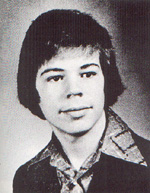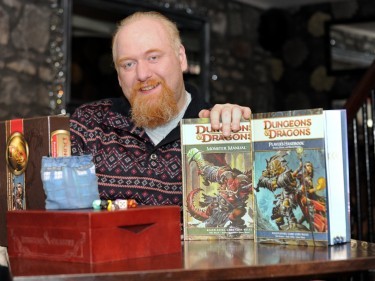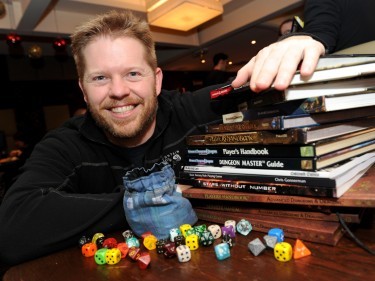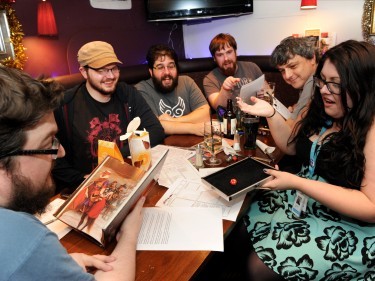They’ve been branded as geeks, social pariahs, even Satanists. But 40 years after Dungeons & Dragons launched on the scene, role-play gamers are playing on, flying in the face of social stigma. So who are the real people behind the hobby, and has public perception improved in four decades?
In 1979, a 16-year-old James Dallas Egbert III entered the steam tunnels of Michigan State University, and disappeared for hours.
The computing child prodigy had left a suicide note in his dorm, causing a police search to be launched, which in turn garnered global media coverage.
How he disappeared was less important than the suspected reasons why. A keen player of the role playing game (RPG), Dungeons & Dragons – a worldwide phenomenon then in its infancy – the public immediately blamed the game for bending Egbert’s view of reality, filling his mind with tales of sorcery and demons.
A trip into the labyrinthine steam tunnels, they surmised, must have been Egbert’s way of living out his role play game fantasies.
In truth, the 16-year-old’s fascination with D&D had little to do with his psychosis and dangerous actions. A host of mental issues, substance abuse problems and crippling parental pressure were in fact the main causes behind his numerous suicide attempts – the last of which a year later was sadly successful when he shot himself.
While the truth behind Egbert’s distressing tale was since told, it did little to tame the moral panic generated by the initial media reports, and the Tom Hanks-fronted TV movie they inspired. The damage was done, and in many ways it helped pave the way for an enduring legacy of public condemnation of the game and its players.
On the extreme end of the spectrum, religious groups have regularly branded D&D and similar RPGs as forms of Satanism; while on the lighter side, the game retains a social stigma to this day, tainted by a preconceived notion that all players are nerdy teenage boys, playing in their parents’ basements.
And yet, as the game celebrates its 40th anniversary this year, with 20million players under its belt across the world, it seems the stigma hasn’t deterred players. From ardent fans to newbies seeking affordable entertainment in austere times, it seems the fantasy game genre has broken out of the basement.
WE ARE NOT SOCIALLY INEPT
The Knights of Trinity hobby games club meets weekly in Aberdeen’s Wild Boar. One of many gaming groups in the city, the Knights boast a thriving membership of both men and women who gather each Tuesday to play an array of RPGs and board games.
I could hear the buzz emanate from the group before I had even entered the area of the pub commandeered for the gaming. Thirty or so members were jovially preparing for an evening of role playing, fuelled in equal measure by active imaginations and pub grub. Steve Ironside, co-founder of the group, greeted me straight away. He had accepted my request to interview the group for one reason: because I had asked to join in a game of D&D. Role playing games, he said, are to be experienced, and not observed. Only then can you see why the misconceptions surrounding them are just that – misconceptions.
“We are not devil worshippers,” the 42-year old Aberdonian said, shaking his head in amusement. A systems analyst for Sparrows Offshore Group, Steve has been hooked on RPGs since he was 17 when he discovered the joy that comes from being the hero at the heart of your own adventure. “We are not socially inept individuals either. It’s a hobby that involves sitting at a table and talking to each other. If you don’t have any real social skills, that’s really going to be tricky,” he added. Steve’s fellow player, Matt Sutherland agreed. A 45-year-old elementary teacher at the International School of Aberdeen hailing from North California, Matt has been playing D&D since 1981 and the enjoyment has followed him across the globe.
“The whole devil worship moment in the 80s demonised the game for quite a while, making gaming a hobby that you hid rather than showed-off,” he said. “I also think a real lack of knowledge and understanding about what role-playing games are hasn’t helped. You have to play to understand, or at least see, what it’s all about.”
YOU CAN BE WHO YOU WANT
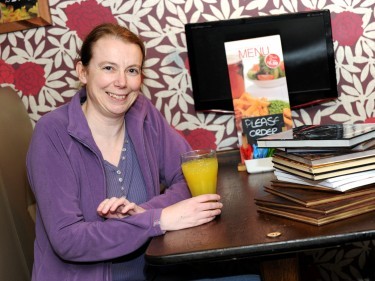
The ‘teenage boy’ stereotype is perhaps the most pervasive and enduring misconception of D&D, many of the gamers told me during the evening I spent with them.
While no doubt initially based on some reality – indeed RPGs have always been popular among teenagers – it’s not an all boys club any more. “It’s also not something that’s just for the young either,” said Steve. “There’s this teenage boy stereotype attached to Dungeons & Dragons, but in terms of female players, we have more now than we have in quite a few years. It’s really nice to see them coming back in.”
In testament, at least five women were playing that night, such as 45-year-old corrosion engineer, Cath Hawkins. A relative newbie to table-top RPGs, being a woman has proved no obstacle to her. “It’s good fun. You come in here and you can be who you want, essentially. When you role play, you don’t have to play as a female, even. But I think D&D is still perceived as a man’s world, though. A very geeky and nerdy stereotype,” she said. And with socialising can come romance too, it seems. Both founders of the group, for example, met their girlfriends through gaming. Is the group a hotbed of romance, I asked Cath? “Well, no,” she said before letting out a laugh. “All the guys here are almost like brothers to me.”
IT’S A SAFE ENVIRONMENT
From the conversations I had that night, two themes were consistent when it came to describing what drew everyone to D&D and other RPG playing: creativity, and socialising. “Something about this sparks people’s imaginations,” said Steve. “The decisions you make in the games are completely up to you. That’s a degree of control you don’t find in any other form of entertainment, unless you’re writing a book yourself.”
And while the Knights of Trinity are by no means a bunch of wallflowers, members who are less gregarious have had a lot to gain from taking part, Steve added. “There are some people who play the hobby who are shy, retiring people who can almost look at it as a way to practice being sociable. It’s a safe environment. Because it’s not you – it’s the character you’re playing. And as a result it gives them license to come out of their shells.”
For Matt, some of his best friends have all come from the gaming groups he’s played with over the years. “The shared interest and camaraderie around the table forge very close bonds. It’s amazing how well you get to know one another when you game together on a regular basis – for better or worse. “The creative side is the other side of the coin for me. I love to create characters, build worlds, and tell stories with the players. My imagination thrives on it,” he said. Cath couldn’t agree more, noting that “it’s the people and the gaming” that have held her interest in the four years she’s been playing.
“When I’ve been in the office all day and looking at engineering diagrams, to come here and do something completely different, it’s such a good vibe. I think also it makes you use your imagination more than watching a film or reading a book. It’s like story telling and being a kid again.”
BEING A NERD IS ‘IN’
There are fewer voices out there condemning D&D as devil worship today thankfully. But that’s not to say some negative preconceptions haven’t lingered.
Cath continued: “If I talk to my colleagues at work, they can sometimes look at you like you’ve grown an extra arm. But they’re a lot more accepting of what it involves when you explain what it is, and the social aspects.” The worst of the stigma seems to have been left in the past. When Steve began playing as a teenager, he recalls his parents were less than keen. He remembers facing their concerns after they had watched an episode of Taggart in the 1990s which was similar in many ways to the real life tale of James Dallas Egbert III. It painted their perception of what playing D&D could lead to.
“My parents had a conversation with me because they were disturbed about the content of the episode, and rightly so. But the game was a side issue, compared to the story of a person who was capable of doing terrible things,” he said. In Matt’s opinion, we are not seeing much in the way of “negative press” about RPGs these days. “The ‘climate’ in the 80s wasn’t the kindest towards nerds and D&D in general. Things are completely different now – being a nerd or a dork is ‘in’, and the fantasy genre is more mainstream; the Lord of the Rings and Marvel movies are a great example. And gaming is far more accepted.”
BREAKING THROUGH
Conversations wrapped up, it was time to follow Steve and Matt’s advice – to break through the misconceptions the best way possible: by playing the game.
As a newbie to role play gaming, I initially approached with trepidation, but it soon passed. A chatty table of five gamers had created an adventure just for me, and had dreamed up a character too. For the next four hours, I was Theren Guard, a half-elf of unknown parentage with a stubborn streak that came from being raised by the city guard. Oh, and owner of a pet mouse called Kiki.
Accompanied by my motley crew of fellow guardsmen, officers, a demonic cleric and a female thief called Fingers McGurk, we set about our adventure. It was a bizarre experience having to negotiate multiple decisions and confrontations from the point of view of the character, but with help I began to get the hang of it. In some circles – not this one thankfully – breaking character is frowned upon. But here, the proceedings were kept light, with me and the crew primarily speaking as ourselves, and only dipping into character when it brought levity to the game.
In fact, while we were delving into the serious business of casting spells, battling evil sorcerers, and even ultimately failing our mission, it was just a great laugh. Like-minded individuals, in a pub for the evening, and casting our imaginations far from the cold streets of Aberdeen, returning for the occasional pint of beer and bowl of chips. No Satan worship, no twisted psychoses.
Just a game.
DUNGEONS AND DRAGONS FACTS
What?: A tabletop role playing game where players embark on pre-written fantasy adventures – co-ordinated by a designated ‘Games Master’ – as characters across a range of races, including elves, dwarves and orcs.
How: Players explore, battle and build points by rolling special dice.
When: It was published by Gary Gygax and Dave Arneson in 1974.
Who: There are a number of celebrity players of D&D, including Vin Diesel, Jon Favreau, James Franco, Moby, and Robin Williams. Michael Gove MP is even a fan.
